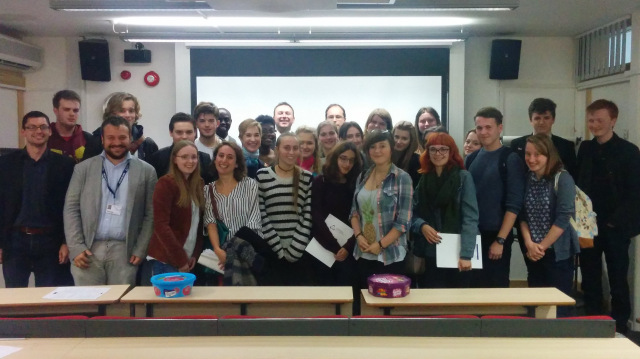European Outreach: CCCU Centre for European Studies Runs Its First Jean Monnet Junior Day for 50+ Local Sixth Form Students
On 9th of October, 2015, our newly-established Jean Monnet Centre for European Studies (CEFEUS) organised and hosted its first “Jean Monnet Junior Day” for 6th form students. Three schools from […]
How a Brexit Would Influence the British Economy, Part 2: The Insurance and Manufacturing Sector
A Four-Part Brexit Blog, hosted by CCCU Politics/IR Jean Monnet Chair in European Foreign Affairs, Dr Amelia Hadfield.
Let’s Talk Business: Analysing the Economic Impact of a Brexit
Britain has entered the battlefield to save, slay or restructure its membership of the European Union. Key players from all national sectors have taken up their positions on all fronts. But clarifying the motivations of British stakeholders and sectors in terms of their support for, or opposition to European integration requires a little more insight. We need to fully understand the challenges faced, and the opportunities on offer from the EU side, and the way in which British industry perceives and responds. British feelings regarding Europe seem mired in semantic differences rather than cultural commonalities. Britain is with, not of Europe. Europe ‘is my continent, not my country’, suggested John Redwood. This produces a sense of resignation in some, who like Stanley Baldwin, argued that ‘whether we like it or not, we are considerably bound to Europe’. For others, the connection at least affords a singular opportunity for British leadership. ‘We have many times led Europe in the fight for freedom’, said Anthony Eden, ‘it would be an ignoble end to our long history if we tamely accepted to perish by degrees.’
This however, is a fight of a different type. It’s fight to determine the vision, and the viability of the Union, and the location of Britain within the EU. These are exciting, confusing, challenging times. And we need some level-headed analysis to chart our way forward. I’m therefore delighted that the Jean Monnet Chair activities, based here in the Politics/IR team of Canterbury Christ Church University, is able to provide open access to fast-moving, contemporary events of real importance, in a way that promotes the work of emerging European scholars. This four-part blog series offers an overview of the particular fears and hopes, and resultant positioning of different business sectors in the struggle to clarify the consequences for a British exit, or ‘Brexit’. In this first post, we examine those areas that are expected to be most gravely affected by a Brexit: the finance sector.
Students enjoy Jean Monnet-funded trip to Brussels
Students and staff recently visited the European Commission in Brussels. Here, Sara Martone shares her experiences from the trip, in her blog ‘A field trip to remember: personal reminiscences of our […]
Reconsidering Horizon 2020
In this blog, CCCU Jean Monnet Chair Amelia Hadfield and CCCU Politics/IR Graduate Michal Gloznek[1] take another look at Horizon 2020, and ask whether it represents an EU investment offensive to boost jobs and growth, or a frontal offensive on research and innovation.
European Foreign Policy at the Crossroads: What lies ahead for the new HR/VP Federica Mogherini?
The world has entered a particularly turbulent period. Eastern Europe is riven by the toughest east-west mêlée since the Cold War, with spats and sanctions raging back and forth between the EU, US and Russia. Israel and Palestine spent the summer locked in intifada-like battles. And ISIS has risen as the newest security threat; galvanising both geopolitical and religious dynamics from Iraq to Syria. Closer to home, UK terror levels totter. In an indication of the overall seriousness of key global issues, the UN has taken the ‘unprecedented’ step of declaring Iraq, South Sudan, Syria, and the Central African Republic to each represent a ‘Level 3 humanitarian crisis, the most severe designation. O tempora, o mores, as Cicero famously said. The times, they are a-tough; the customs, they need to keep up. So do EU personnel. This first CCCU Jean Monnet Chair Blog reflects upon the challenges facing European foreign affairs as a result of the changeover of staff in late 2014.
Canterbury Christ Church Academic Attends Major EU Conference
Dr Amelia Hadfield was invited to speak at the annual Jean Monnet Conference in Brussels, on 14-15 November.

